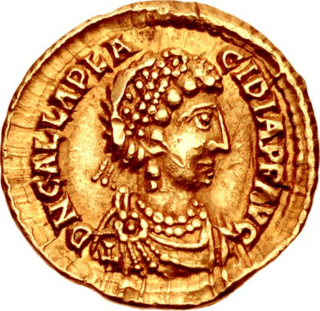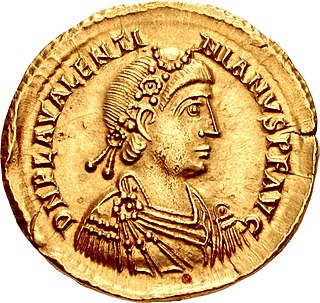Justa Grata Honoria was a granddaughter of the Western Roman Emperor Theodosius I.
Contents
Honoria may also refer to:
Justa Grata Honoria was a granddaughter of the Western Roman Emperor Theodosius I.
Honoria may also refer to:

Galla Placidia, daughter of the Roman emperor Theodosius I, was a mother, tutor, and advisor to emperor Valentinian III, and a major force in Roman politics for most of her life. She was queen consort to Ataulf, king of the Visigoths from 414 until his death in 415, briefly empress consort to Constantius III in 421, and managed the government administration as a regent during the early reign of Valentinian III, until her death.
Mary may refer to:

Year 417 (CDXVII) was a common year starting on Monday of the Julian calendar. At the time, it was known as the Year of the Consulship of Honorius and Constantius. The denomination 417 for this year has been used since the early medieval period, when the Anno Domini calendar era became the prevalent method in Europe for naming years.

Year 434 (CDXXXIV) was a common year starting on Monday of the Julian calendar. At the time, it was known as the Year of the Consulship of Aspar and Areobindus. The denomination 434 for this year has been used since the early medieval period, when the Anno Domini calendar era became the prevalent method in Europe for naming years.

Winchester is a cathedral city in Hampshire, England. The city lies at the heart of the wider City of Winchester, a local government district, at the western end of the South Downs National Park, on the River Itchen. It is 60 miles (97 km) south-west of London and 14 miles (23 km) from Southampton, its nearest city. At the 2011 census, Winchester had a population of 45,184. The wider City of Winchester district, which includes towns such as Alresford and Bishop's Waltham, has a population of 116,595. Winchester is the county town of Hampshire and contains the head offices of Hampshire County Council.
Arsinoe Ancient Greek: Ἀρσινόη, romanized: Arsinoë, pronounced Arsinoi in modern Greek, may refer to:

Valentinian III was Roman emperor in the West from 425 to 455. Made emperor in childhood, his reign over the Roman Empire was one of the longest, but was dominated by powerful generals vying for power amid civil wars and the invasions of Late Antiquity's Migration Period, including the campaigns of Attila the Hun.
Winchester is a historic city in southern England.

Justa Grata Honoria, commonly referred to during her lifetime as Honoria, was the older sister of the Western Roman Emperor Valentinian III. She is famous for her plea of love and help to Attila the Hun, which led to his proclamation of his claim to rule the Western Roman Empire.

Honoria Glossop is a recurring fictional character in the Jeeves stories by English comic writer P. G. Wodehouse. Athletic as well as scholarly, she is a formidable young lady and one of the women whom Bertie Wooster becomes reluctantly engaged to.

Murder is Easy is a work of detective fiction by Agatha Christie and first published in the UK by the Collins Crime Club on 5 June 1939 and in the US by Dodd, Mead and Company in September of the same year under the title of Easy to Kill. Christie's recurring character, Superintendent Battle, has a cameo appearance at the end, but plays no part in either the solution of the mystery or the apprehension of the criminal. The UK edition retailed at seven shillings and sixpence (7/6) and the US edition at $2.00.
Prusias may refer to :

Attila is a 1954 Italian-French co-production, directed by Pietro Francisci and produced by Dino De Laurentiis and Carlo Ponti for Lux Film. Based on the life of Attila the Hun, it stars Anthony Quinn as Attila and Sophia Loren as Honoria, with French leading man, Henri Vidal, as the Hun's antagonist, Flavius Aetius. Irene Papas, in the second of three contract pictures for Lux Film, plays one of Attila's wives, Grune. Ettore Manni, Christian Marquand, and Claude Laydu are among the supporting cast of mostly French and Italian actors. American Scott Marlowe (1932–2001) made his screen debut in the film. Along with The Pride and the Passion and Houseboat, it was one of Loren's biggest box-office successes during the 1950s.
The Sisters of Charity of the Immaculate Conception (SCIC) were established in 1854 by Honoria Conway and her companions in Saint John, New Brunswick. They serve in Canada, Peru, and Ireland.
Tium was an ancient settlement, also known as Filyos, on the south coast of the Black Sea at the mouth of the river Billaeus in present-day Turkey. Ancient writers variously assigned it to ancient Paphlagonia or Bithynia.

John Butler (1717–1802) was an English bishop and controversialist.
Flavius Bassus Herculanus was an aristocrat and a politician of the Western Roman Empire, husband of Justa Grata Honoria. He was honoured with the consulate in 452 with Sporacius as his colleague.
"Babylon Revisited" is a short story by F. Scott Fitzgerald, written in 1930 and first published on February 21, 1931 in the Saturday Evening Post and free inside The Telegraph, the following Saturday.

Dickensian is a British drama television series that premiered on BBC One from 26 December 2015 to 21 February 2016. The 20-part series, created and co-written by Tony Jordan, brings characters from many Charles Dickens novels together in one Victorian London neighbourhood, as Inspector Bucket investigates the murder of Ebenezer Scrooge's partner Jacob Marley.
"Jeeves and the Greasy Bird" is a short story by English humorist P. G. Wodehouse, and features the young gentleman Bertie Wooster and his valet Jeeves. The story was published in Playboy magazine in the United States in December 1965, and in Argosy magazine in the United Kingdom in January 1967. The story was also included in the 1966 collection Plum Pie.